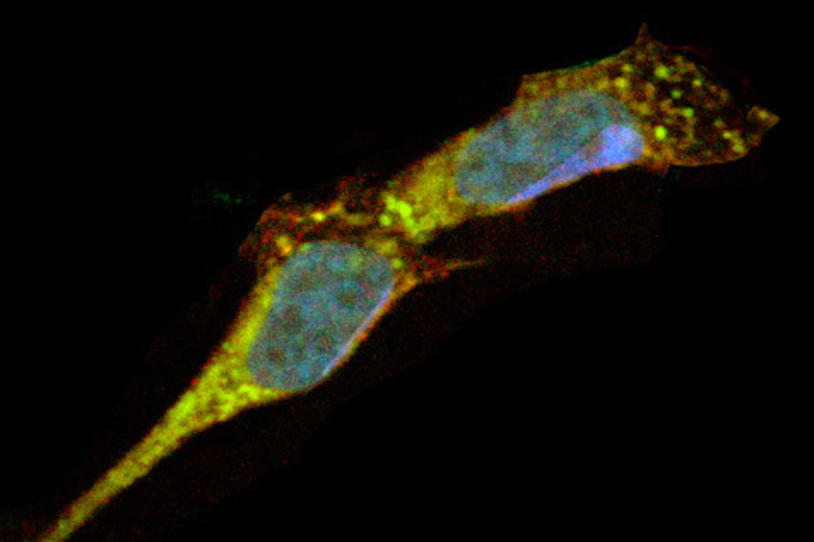
LRRK2 Cells, Credit: Greenamyre Lab
Today, there are three potential Parkinson’s therapies targeting leucine-rich repeat kinase 2 (LRRK2) in human clinical trials. But this entire area of drug development was nearly derailed, before The Michael J. Fox Foundation and teams of dedicated partners stepped in. Several recently published papers detail these efforts and their results.
Back in 2004, researchers discovered that mutations in the LRRK2 gene were associated with Parkinson’s disease risk. The Michael J. Fox Foundation began funding an aggressive research agenda into LRRK2 soon after, to understand exactly how these mutations increased Parkinson’s risk and what could be done to treat people with them. We now understand that LRRK2 mutations cause overactivity in the LRRK2 protein encoded by the gene. (Later MJFF-funded research by J. Timothy Greenamyre, MD, PhD uncovered that LRRK2 is also overactive in people with Parkinson’s who do not have a genetic mutation.)
Based on early research, drug developers began pursuing ways to inhibit LRRK2 and reduce its overactivity as a treatment for Parkinson’s. Preclinical research funded by MJFF in 2012 and 2013 and conducted by a team at Genentech found that two compounds designed to inhibit LRRK2 resulted in changes in the lungs that might indicate pulmonary toxicity. The resulting paper by lead author Reina N. Fuji, PhD, published in Science Translational Medicine in 2015, called the results a “cautionary note for pharmacological modulation of LRRK2 in humans.”
This finding threatened the future of LRRK2 drug development, as serious safety concerns would make human clinical testing difficult if not impossible. But there remained a lot of unanswered questions. Was it on on-target effect or a side effect of the compound(s)? Were the lung changes permanent or would lungs return to normal after treatment is stopped? And, ultimately, is LRRK2 inhibition harmful to human health and thus not a viable treatment strategy for Parkinson’s?
MJFF realized we needed to answer these questions quickly for the future of LRRK2 therapeutic development. We convened the LRRK2 Safety Initiative in 2013 with partners at Genentech, Denali Therapeutics, Merck & Co., and Pfizer. The companies contributed LRRK2 inhibitor compounds to the effort and participated in the studies, which also included Covance and Lovelace Respiratory Research Institute. It is not typical for pharmaceutical companies to collaborate, but as a neutral party, MJFF was able to bring the consortium together to conduct the studies quickly.
The Safety Initiative found that lung changes happened for all compounds, were on-target effects, and were reversible and not associated with any reduction in lung function. The results from the LRRK2 Safety Initiative were published in Science Translational Medicine last month in a paper by lead author Marco Baptista, PhD, Vice President of Research Programs at MJFF.
We also decided to tackle the problem from a different angle. While the LRRK2 Safety Initiative studies were underway, MJFF began a second project. Some people have genetic mutations that naturally inhibit LRRK2 activity. These “loss-of-function” variants reduce LRRK2 in amounts similar to some of the therapies being tested and represent a second way to examine the effects of LRRK2 reduction on human health. MJFF partnered with a team of researchers to examine people with loss-of-function LRRK2 variants in the Genome Aggregation Database (gnomAD), UK Biobank, and 23andMe and evaluate the consequences of reducing LRRK2 activity. The study’s results, published this week in Nature Medicine in a paper by lead author Nicola Whiffin, PhD, show that these variants are not associated with any negative effects on health.
MJFF’s Dr. Baptista, in an interview in Alzforum last month stated the goal of these research efforts: “We wanted to help facilitate early clinical trials.” Thanks to the LRRK2 Safety Initiative and all the partners who participated in these studies, Denali Therapeutics was able to advance two LRRK2 inhibitors into human clinical testing. Biogen has also entered trials with a therapy targeting LRRK2. Early safety data from these trials confirms the earlier research, finding no changes in lung function. Dr. Baptista now looks toward the future of this research, “Soon, we will have efficacy data from these trials and begin to understand the true potential of LRRK2 inhibitors to help people with Parkinson’s. None of this progress would have been possible without our research partners and their willingness to work together to get the best outcome for patients.”